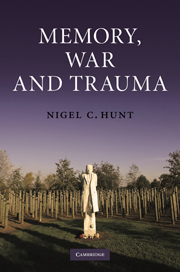Book contents
- Frontmatter
- Contents
- Preface
- 1 Background and purpose
- 2 Historical perspective
- 3 Methods and ethics
- 4 Current theory: post-traumatic stress disorder
- 5 Approaches to understanding trauma
- 6 Positive outcomes of traumatic experiences
- 7 Memory and history
- 8 Personal narrative and social discourse
- 9 Illustrating narrative as a scientific technique: the role of social support
- 10 Ageing, trauma and memory
- 11 Literature and trauma
- 12 Memorialisation and commemoration
- 13 Battlefield tours
- 14 Conclusions and future directions
- References
- Index
9 - Illustrating narrative as a scientific technique: the role of social support
Published online by Cambridge University Press: 05 June 2012
- Frontmatter
- Contents
- Preface
- 1 Background and purpose
- 2 Historical perspective
- 3 Methods and ethics
- 4 Current theory: post-traumatic stress disorder
- 5 Approaches to understanding trauma
- 6 Positive outcomes of traumatic experiences
- 7 Memory and history
- 8 Personal narrative and social discourse
- 9 Illustrating narrative as a scientific technique: the role of social support
- 10 Ageing, trauma and memory
- 11 Literature and trauma
- 12 Memorialisation and commemoration
- 13 Battlefield tours
- 14 Conclusions and future directions
- References
- Index
Summary
One of the problems with narrative is its psychological application in a practical manner. Describing narratives scientifically is a difficult task. A story, however presented, consists of a complex set of rules and statements, which do not necessarily lend themselves to a straightforward analysis, particularly if the analysis must be inked to other variables, such as scores on a measure of PTSD.
The narrative approach, as we have seen, was largely developed in the social sciences, particularly sociology, being ‘brought over’ to psychology in a number of ways by a variety of people. While this has added enormously to psychological understanding, there have been, and remain, issues regarding the scientific use of narrative approaches in psychology, approaches that are acceptable to the broader group of psychologists, many of whom are embedded in the quantitative tradition. For many quantitative psychologists, qualitative approaches are still anathema, so there is a need to demonstrate the utility of such approaches. One example is presented here. This chapter is based on the PhD work of Dr Karen Burnell, whom I jointly supervised with Peter Coleman.
As already discussed, narrative is key to our understanding of our lives, the ways in which we think and the ways in which we interact with other people. It is in our nature to (it is unavoidable to) talk to each other in story form, to explore our identity and to share experiences.
- Type
- Chapter
- Information
- Memory, War and Trauma , pp. 127 - 139Publisher: Cambridge University PressPrint publication year: 2010



